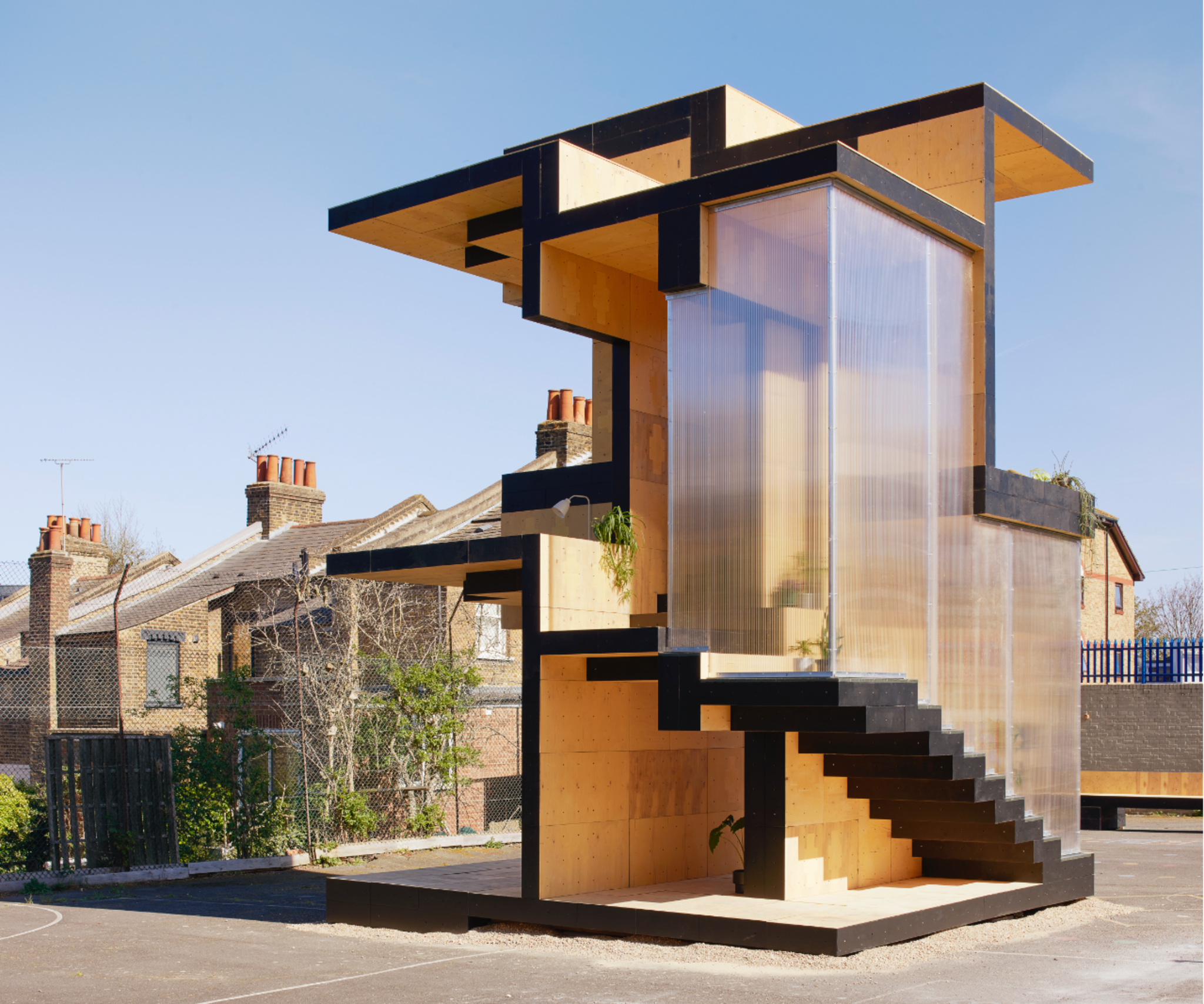Resilience and the City
The building blocks for a new kind of architecture
A Bartlett team tested their micro-factory approach for localised production in East London, enabling community participation in designing and building the homes they need.
The shortage of housing in the UK is an ongoing crisis, felt keenly in London. To address this condition and to take advantage of new technology, The Bartlett’s Automated Architecture (AUAR) Labs created House Block: a temporary housing prototype in East London, from April to May 2021. The project consisted of a series of experiments developing AUAR Labs’ discrete framework for housing production, one which repositions the architect from author of a product to curator of a system, someone who enables participants to engage with active agency. This is a novel position, of course, so this project was focused on making the potential of automation tangible for local communities.
Above: House Block rear view, articulated facade. Each block was CNC milled from a single sheet of plywood. Photo by James Harris
Above: View of cantilevered floor. House Block was designed and built using AUAR Labs’ discrete housing system. Photo by James Harris
Above: House Block front elevation. Block Type A is an open-ended system. Each block could be used as a column, floor slab, wall or stair. Photo by James Harris
House Block was designed and built using AUAR Labs’ discrete housing system consisting of a kit of parts, known as Block Type A. Each block was CNC milled from a single sheet of plywood, assembled by hand and then post-tensioned on site. Constructed from 270 identical blocks, there were no predefined geometric types or hierarchy between parts. As an open-ended, adaptive system each block could be used as a column, floor slab, wall or stair — allowing for disconnection, reconfiguration and reassembly. The democratisation of design and production that defines the system created points for alternative value systems to enter and for a realignment in architectural production.
Above: Detail of House Block’s cantilevered floor. The project was delivered in partnership with Hackney Council. Photo by James Harris
Above: Interior view of House Block, a two-storey dwelling unit prototype built in Clapton, East London using the Block Type A housing system. Photo by James Harris
Above: View of the central staircase of the 52 sq m structure, built over 3 weeks in Spring 2021, with East London visible beyond. Photo by James Harris
Left: House Block was built in a disused playground in Clapton, surrounded by residential buildings. Photo by James Harris
“House Block made tangible the social and economic possibilities of decentralised modes of digital fabrication.”
The two-storey, 52 sq m structure was built on the site of a former playground in Clapton over a three-week period. It was delivered in partnership with Hackney Council, as part of an ongoing discussion and shared interest in alternative methods of affordable housing delivery and development of small plots. House Block made tangible the social and economic possibilities of decentralised modes of digital fabrication. In partnership with New City College’s Hackney campus, a work experience programme invited students who might normally not engage with automation to explore how it may benefit their practice. Through the assembly of 320 blocks, 70 construction, carpentry and multi-skills students and apprentices participated in a dialogue about the potential of localised automation (such as CNC milling and robotic assembly) with short production chains that upskill local labour and create new kinds of jobs in a more inclusive, just future.
Above: Finishing of blocks. The Bartlett team worked with Waltham Forest Future Creatives at the professional maker space Building Bloqs. Photo by AUAR
Above: Pre-fabrication is one of the key strengths of Block Type A. It provides a higher level of finish than if it was built on site. Photo by AUAR
A series of ‘takeovers’ — small-scale, creative, experimental explorations — extended critical understandings of automation. Activated by responses to the housing prototype, the takeovers enabled live experimentation with House Block. Residents participated in their production, gaining lifelong skills and agency, along with experiential learning of part-to-whole relationships within a local context. A programme of talks and events provided further entry points, reaching over 200 members of the public on the potential of discrete automation: how it might add to the commons and support new housing policies.
Above: One of the House Block takeovers, where participants experimented with Block Type A. Here, it is the firm U-Build having a go. Photo by James Harris
